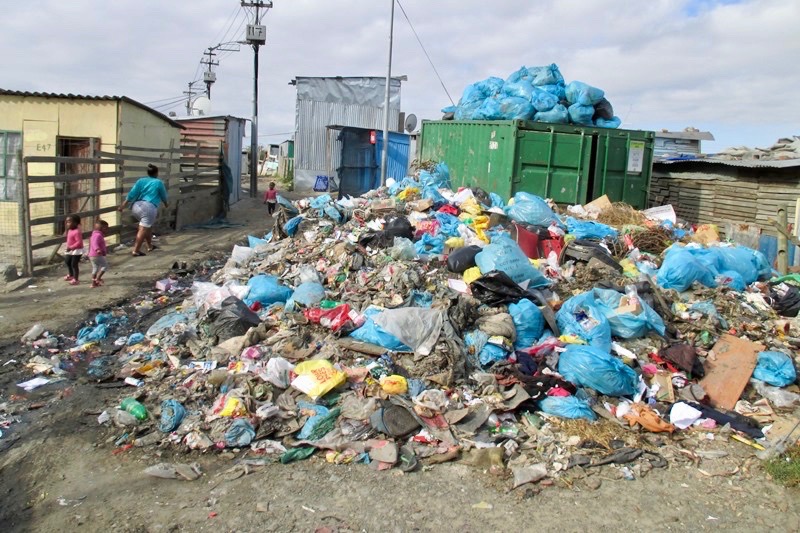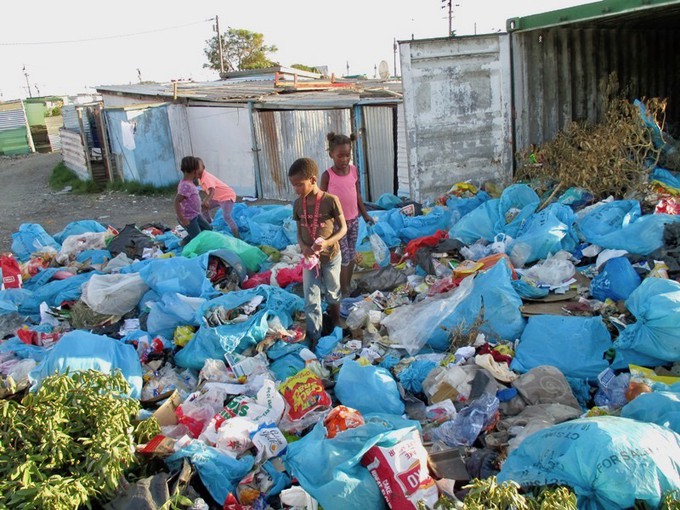Maggots in baby’s mouth as uncollected garbage piles up
A dispute over refuse removal services in early December has left the informal settlement of Europe near Nyanga with growing mounds of rubbish
Residents at Europe Informal Settlement in Nyanga are living with growing mounds of uncollected rubbish. They say the smell is unbearable in the recent hot weather, and the place is becoming infested with maggots, flies, and rats. The rubbish also contains the rotting bodies of dead cats and dogs.
GroundUp visited the site and found gullies of waste water with faeces and rotten food.
The mounds of rubbish have been growing at three local dumping sites since the beginning of December, after a dispute erupted in the area between the City of Cape Town and residents over the employment of contract communal cleaners.
Members of the local community wished to select new recruits randomly at a local community meeting and not use the City’s database, a process they say lacks transparency and favours certain individuals.
Nonkululeko, a 42-year-old resident, who has lived in the area since 1992, said, “It is not just the stench which bothers us, but sometimes we find our children blowing up used condoms they picked up in the rubbish.”
Another resident, 70-year-old Nobandla Mfunekiso, asked that authorities best set aside the dispute and just help the community clear up the rubbish.
“On Sunday morning, my 15-year-old grandson alerted me … He found my one-year and three-month old great-granddaughter with a white maggot sticking out of her mouth … How many maggots had the child swallowed?”
Nomzamo Mavalantiya, who is 40 and sells braaied meat, said the uncollected rubbish had disturbed her business because of the flies and the stench. “We are against the usage of the municipal database … that sometimes results in certain people being hired repeatedly for the same job,” she said. She also alleged that residents discovered 16 people hired by the previous ward councillor were not even in the municipality’s system.
“The government should allow the process to be conducted at a community meeting with the involvement of all the areas’ residents to convince us about transparency,” said 58-year-old resident Mzukisi Mbanga.
Zibele Sithole, a community leader, demanded that current Ward 40 Councillor Bongani Ngcombolo exclude himself from the employment process.
Ngcombolo said the Database system was free and fair. “I am prepared to invite them [residents] with our community leaders to witness it [the selection process] when it is conducted, so they can experience the system involves no corruption. I beg them to trust it, and as their leader, I will do everything to support them all the way,” said Ngcombolo.
He confirmed that the municipality’s investigation on the hiring of 16 cleaners last year had involved some corruption.
Councillor Xanthea Limberg, the City’s Mayoral Committee Member for Informal Settlements, Water and Waste Services, and Energy, confirmed that the City is aware of the matter and had referred it to Mayor Patricia De Lille’s office. Limberg added that De Lille had declined the proposition to deviate from the City’s random selection process and that they will arrange a meeting will the local community to convey the matter.
“Delivery of services was halted by residents who sought to influence the recruitment process for cleansing contracts in the area. The City has been clearing dumped material on an ad-hoc basis,” said Limberg.

Support independent journalism
Donate using Payfast

Don't miss out on the latest news
We respect your privacy, and promise we won't spam you.
Next: Vigilante violence leaves Malawian family homeless
Previous: Marikana lawyer calls for state to expropriate land
© 2017 GroundUp. 
This article is licensed under a Creative Commons Attribution-NoDerivatives 4.0 International License.
You may republish this article, so long as you credit the authors and GroundUp, and do not change the text. Please include a link back to the original article.

